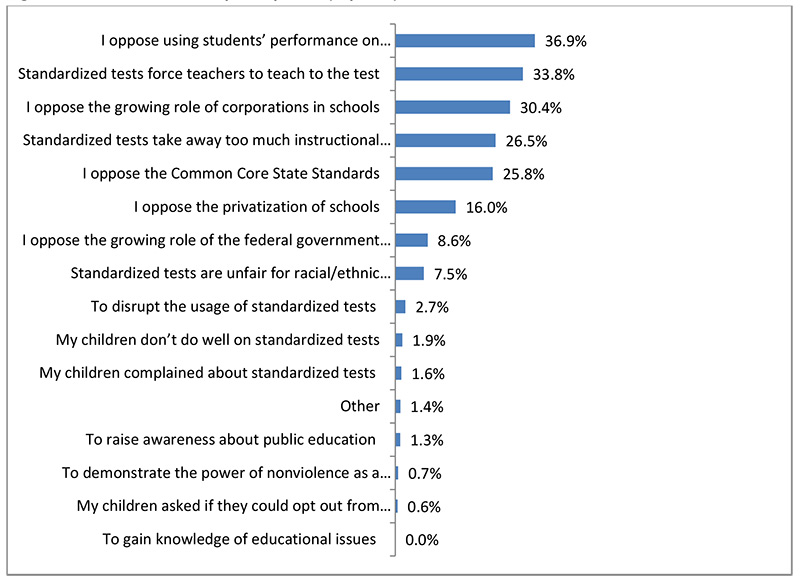Important read with a good number of cited resources and evidence below that you can take to your school board. The concerns surrounding standardized, especially, high-stakes testing are manifold, but I draw attention herein to the hijacking of public education by so-called reformers that seek to profit on the public's hard-earned taxpayer dollars in a way that is bringing public education in lots of places to its knees. Instead of getting behind the crucial fight for more investment in public education (K12 and higher education), these groups are takers, in search of profits.
Hence the expressed concern about corporatization and marketization includes the crippling—if not the entire dismantling—of public education. Their goal is to make public education weak to pave the way for their profit-making alternatives. And then they draw on civil rights rhetoric to claim that they act on behalf of and in the best interest of our underprivileged communities of color.
Critics like myself and others have been exposing this not-so-hidden agenda for years. In fact, this blog came into existence precisely out of our need to educate the public so that they could act intelligently on the basis of credible information on this and other related matters.
What should not get lost here in this narrative on these interconnected concerns of standardized testing and corporatization involve enormous collusion with the political elite that sustains this. It's not just business people behind this, but our actual leadership in our Departments of Education and state government—indeed, our "corporate state."
As advocates for our minority communities particularly impacted not only by our current system of testing, but also by a long history of testing, tracking, ability grouping, and rote learning, we always knew that once Anglos stopped seeing themselves as beneficiaries and in fact experienced personally what our minority communities have been experiencing since day one, change would finally occur.
We should feel encouraged, but also vigilant so that we do not even in this important moment reinscribe relations of dominance and subordination—and in so doing, reinscribe white, middle class privilege.
Yes, opt out of this nonsense, but also join our great and noble continuing struggle for equitable school finance, bilingual education, de-tracking, and ethnic studies!
Angela Valenzuela
c/s
What's Driving the Opt-Out Movement? The belief that high-stakes testing promotes rote learning and is unfair to teachers, a TC survey finds
Teachers College unveiled the findings of Who Opts Out and Why?—the first national, independent survey of the “opt-out” movement—which reveals that supporters oppose the use of test scores to evaluate teachers and believe that high-stakes tests force teachers to “teach to the test” rather than employ strategies that promote deeper learning. The new survey also reports concern among supporters about the growing role of corporations and privatization of schools.
Oren Pizmony-Levy, Assistant Professor of International & Comparative Education
Who Opts Out and Why? also reveals that opt-out proponents oppose high-stakes, standardized testing because they believe it takes away too much instructional time.
The survey follows recent reports that the opt-out movement in New York has neither grown nor faded. In its July 29 report on 2016 standardized test scores, New York State disclosed that about 21 percent, or an estimated 250,000 of the approximately 1.1 million eligible public school students across the state, declined to take the tests. These figures do not significantly differ from the previous year, when New York State led the nation in combined math and English Language Arts test refusals.
Among the national survey’s 65 questions, respondents were asked to pick the two top reasons why they participated in opt-out activities. The answers revealed that:
- 36.9 percent said they oppose using students’ performance on standardized tests to evaluate teachers;
- 33.8 percent said they believe standardized tests force teachers to “teach to the test” by using drilling and worksheets to promote memorization of test answers rather than more complex, inquiry-based learning strategies;
- 30.4 percent said they oppose the growing role of corporations in schools;
- 26.5 percent said they believe standardized tests take away too much instructional time;
- 25.8 percent said they oppose the Common Core State Standards (CCSS); and
- 16 percent said they oppose the privatization of schools, a concern that is closely tied to fears about the growing role of corporations in public schools.

Nancy Green Saraisky (Ph.D. '15), Assistant Adjunct Professor

Motivations for participation (top two). Click here to zoom.
It shows that opt-out proponents reject not only the popular narrative that public education in America is failing, but also the notion that, even if it were, more standardized testing would fix it. “People in the opt-out movement are not saying the whole system is broken,” said Green Saraisky. “They’re not anti-testing; they’re anti-standardized testing.”
Respondents believe that opting out “is about political challenge to current educational reform,” Pizmony-Levy said. “Policy makers need to take opt-out supporters seriously and pay attention to what motivates them and what ideas they bring to the table.”
The complete Who Opts Out and Why? survey and results can be downloaded here.
Related Links
TC Survey of Opt-Out Movement Shows Opposition to Test-Based Teacher Evaluations (Education Week)
Who is driving the opt-out movement? The answer might surprise you (Chalkbeat)
Opt-out activists also oppose test-based evals, privatization (Education Dive)
Teachers College Survey: Who Opts Out and Why? (Diane Ravitch's Blog)

No comments:
Post a Comment